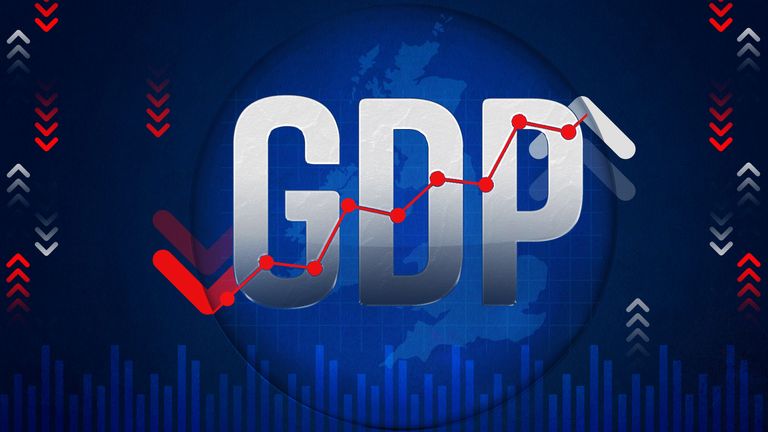‘Heightened recession risks’ as economy on course for contraction, report warns | Business News
A closely-watched indicator of economic activity suggests the economy is on course to contract in the current third quarter of the year and warns of “heightened recession risks”.
A preliminary reading for the S&P Global/CIPS Purchasing Managers’ Index (PMI), which covers the dominant services sector and manufacturing, highlighted a slump in factory output and broader weakness during August.
It blamed stubbornly high inflation and the effects of the battle to get the pace of price increases down, namely successive interest rates hikes by the Bank of England.
The survey’s data, it estimated, pointed to a 0.2% fall in overall economic output during the three months to the end of September.
If that was realised, it would not trigger a recession but potentially signal the start of one.
That is because two consecutive quarters of negative growth are needed to meet the technical definition. The economy grew by 0.2% in the three months to June.
The UK figures were published shortly after those for Germany and the wider euro area which showed similar trends.
The PMIs suggested that business activity in Europe’s largest economy, which is already in recession, contracted at the fastest pace for more than three years in August.
Its powerhouse manufacturing sector was found to have suffered a deeper downturn than expected while consumers also tightened their belts as services activity contracted sharply.
Germany led the wider eurozone’s reading deeper into negative territory.
Evidence of a growing slowdown prompted financial markets to trim their bets for a fresh hike to interest rates by the European Central Bank (ECB) next month.
That is despite inflation across the 20 nations that use the single European currency standing at 5.3%, according to the latest reading.
It remains well above the central bank’s 2% target.
Refinitiv data suggested that only 40% of market participants were now anticipating a 0.25 percentage point rate hike at the next ECB meeting.
The figure had stood at 60% before the worse-than-expected PMI data was released.
It is a nod to fears that further rate hikes risk deepening Germany’s economic woes at a time when its manufacturers are already grappling the effects of steep falls in demand both at home and abroad, particularly in China.
The reaction to the UK data saw reductions in peak UK interest rate expectations too, with the pound also losing some of its recent steam against both the dollar and the euro.
Chris Williamson, chief business economist at S&P Global Market Intelligence, said of the economy’s fortunes: “The early PMI survey for August suggests that inflation should moderate further in the months ahead, but also
indicates that the fight against inflation is carrying a heavy cost in terms of heightened recession risks.
“A renewed contraction of the economy already looks inevitable, as an increasingly severe manufacturing downturn is accompanied by a further faltering of the service sector’s spring revival.”
He added: “Companies are reporting reduced orders for goods and services as demand is increasingly hit by the cost-of-living crisis, higher interest rates, export losses and concerns about the economic outlook.
“Although cost pressures remain elevated, thanks mainly to rising wages, the deteriorating demand environment is
curbing companies’ pricing power.”

